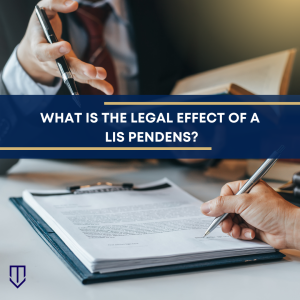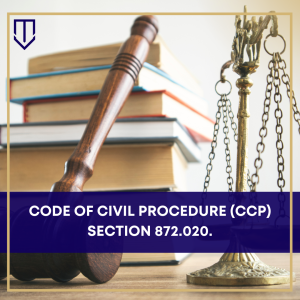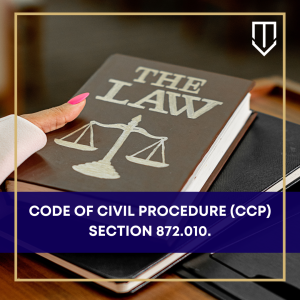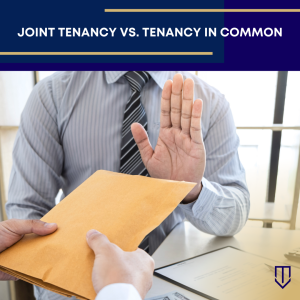 Lawsuits that affect interests in real property, such as partition actions, often require courts to adjudicate competing claims regarding who should have title to or possession of real property. In general, courts adjudicating such disputes follow the principle of “first in time, first in right.” Under this principle, “a conveyance recorded first generally has priority over any later-recorded conveyance.” (First Bank v. East West Bank (2011) 199 Cal.App.4th 1309, 1313.)
Lawsuits that affect interests in real property, such as partition actions, often require courts to adjudicate competing claims regarding who should have title to or possession of real property. In general, courts adjudicating such disputes follow the principle of “first in time, first in right.” Under this principle, “a conveyance recorded first generally has priority over any later-recorded conveyance.” (First Bank v. East West Bank (2011) 199 Cal.App.4th 1309, 1313.)
An important factor that courts consider when adjudicating cases affecting interests in property is whether each party affected by the court’s judgment had notice of the litigation or judgment. A judgment affecting title to or possession of real property that is recorded imparts “constructive” notice to a subsequent transferee or encumbrancer. When recorded, such judgment is effective against any subsequent conveyance or encumbrance, regardless of whether the parties to that judgment receive notice about the subsequent conveyance or encumbrance. (Civ. Code, § 1214.)
In contrast, a judgment that is not recorded with the recorder’s office of the county in which a property is located does not impart constructive notice to subsequent transferees or encumbrancers of the property. Any such judgment generally is not binding on a subsequent transferee or encumbrancer who acquires and records an interest in the property without notice of the prior litigation or judgment. (Civ. Code, § 1214.)
 California Code of Civil Procedure section 872.020 is under Title 10.5 Partition of Real and Personal Property. This statute details the scope, or in other words, the actions of partition that the title controls. The statute aims to clarify the property to which Partition Law actions may apply.
California Code of Civil Procedure section 872.020 is under Title 10.5 Partition of Real and Personal Property. This statute details the scope, or in other words, the actions of partition that the title controls. The statute aims to clarify the property to which Partition Law actions may apply.  California Partition Law Blog
California Partition Law Blog


 Partitions sales and trustee sales are two different ways that a property can be sold. A main difference between the two is that a partition sale is ordered and overseen by the court, while a trustee sale is overseen by a third party in relation to foreclosure proceedings. While the third party is not beholden to a court ruling in a trustee sale, they must still follow the procedures outlined in California law.
Partitions sales and trustee sales are two different ways that a property can be sold. A main difference between the two is that a partition sale is ordered and overseen by the court, while a trustee sale is overseen by a third party in relation to foreclosure proceedings. While the third party is not beholden to a court ruling in a trustee sale, they must still follow the procedures outlined in California law. The
The  Lawsuits that affect interests in real property, such as partition actions, often require courts to adjudicate competing claims regarding who should have title to or possession of real property. In general, courts adjudicating such disputes follow the principle of “first in time, first in right.” Under this principle, “a conveyance recorded first generally has priority over any later-recorded conveyance.” (
Lawsuits that affect interests in real property, such as partition actions, often require courts to adjudicate competing claims regarding who should have title to or possession of real property. In general, courts adjudicating such disputes follow the principle of “first in time, first in right.” Under this principle, “a conveyance recorded first generally has priority over any later-recorded conveyance.” ( Generally, a co-owner of real property may commence an action in a partition. Owners of an estate of inheritance, a life estate, or an estate for years who hold such interest concurrently or in successive estates may seek to
Generally, a co-owner of real property may commence an action in a partition. Owners of an estate of inheritance, a life estate, or an estate for years who hold such interest concurrently or in successive estates may seek to 
 A deed is a legal instrument, evidenced in writing, to confirm the ownership interest or legal rights of an owner of real property. Essentially, a deed is necessary to determine the titleholder of a piece of real estate. Moreover, a deed grants an owner of real property legal rights to convey, sell, or transfer the property. Therefore, when purchasing a piece of real property, it is extremely important for a person to obtain a deed in order to evidence their ownership in writing and protect their legal rights in the property.
A deed is a legal instrument, evidenced in writing, to confirm the ownership interest or legal rights of an owner of real property. Essentially, a deed is necessary to determine the titleholder of a piece of real estate. Moreover, a deed grants an owner of real property legal rights to convey, sell, or transfer the property. Therefore, when purchasing a piece of real property, it is extremely important for a person to obtain a deed in order to evidence their ownership in writing and protect their legal rights in the property.  Following the explosive split between the two stars in the hit reality show, “Vanderpump Rules,” many are left wondering what will become of the couple’s $2.2 million dollar home. Prior to their split, Ariana Madix and Tom Sandoval bought a farmhouse-style home in 2019 and took their time to renovate the Property into their dream home.
Following the explosive split between the two stars in the hit reality show, “Vanderpump Rules,” many are left wondering what will become of the couple’s $2.2 million dollar home. Prior to their split, Ariana Madix and Tom Sandoval bought a farmhouse-style home in 2019 and took their time to renovate the Property into their dream home. 
 Yes, although the tenant is not allowed to exclude the non-consenting owners. The reason for this is grounded in ancient legal doctrine regarding the “right to possession” that all co-owners of property share together. Each owner may exercise this right, and each may grant it to a third party, should they so choose, even without the consent of the other owners.
Yes, although the tenant is not allowed to exclude the non-consenting owners. The reason for this is grounded in ancient legal doctrine regarding the “right to possession” that all co-owners of property share together. Each owner may exercise this right, and each may grant it to a third party, should they so choose, even without the consent of the other owners.